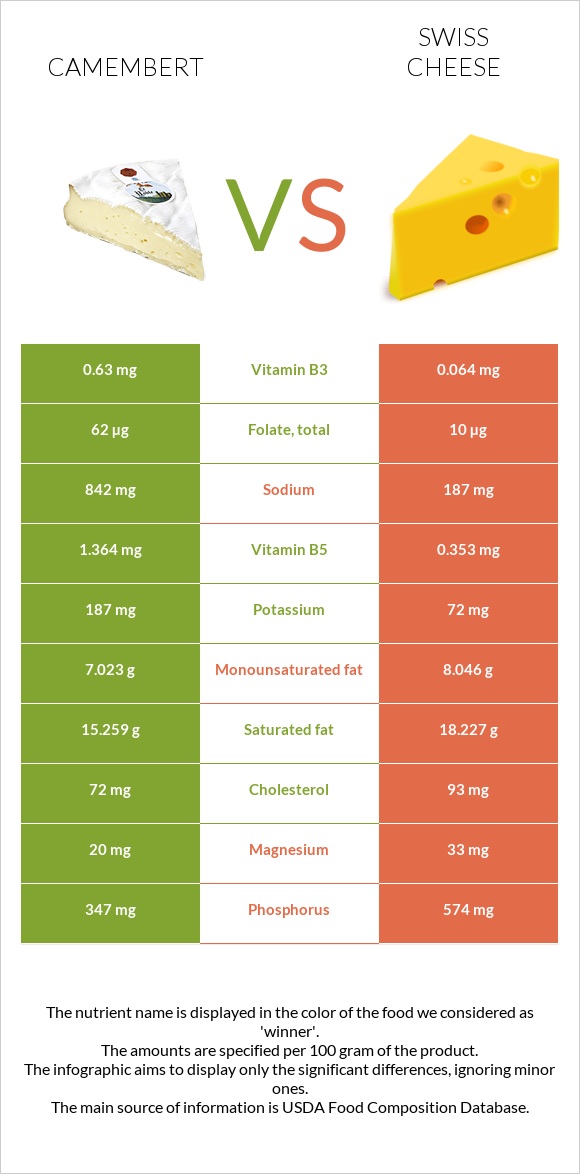Camembert vs. Swiss cheese — In-Depth Nutrition Comparison
Compare
What are the differences between camembert and Swiss cheese?
- Camembert is higher in vitamin B5, vitamin B2, and folate, yet Swiss cheese is higher in vitamin B12, calcium, phosphorus, selenium, and zinc.
- Swiss cheese's daily need coverage for vitamin B12 is 73% more.
- Camembert has 6 times more folate than Swiss cheese. While camembert has 62µg of folate, Swiss cheese has only 10µg.
- The amount of sodium in Swiss cheese is lower.
We used Cheese, camembert and Cheese, swiss types in this article.
Infographic

Infographic link
Mineral Comparison
Mineral comparison score is based on the number of minerals by which one or the other food is richer. The "coverage" charts below show how much of the daily needs can be covered by 300 grams of the food.
| Contains more PotassiumPotassium | +159.7% |
| Contains more IronIron | +153.8% |
| Contains more ManganeseManganese | +46.2% |
| Contains more MagnesiumMagnesium | +65% |
| Contains more CalciumCalcium | +129.4% |
| Contains more CopperCopper | +123.8% |
| Contains more ZincZinc | +83.6% |
| Contains more PhosphorusPhosphorus | +65.4% |
| Contains less SodiumSodium | -77.8% |
| Contains more SeleniumSelenium | +106.9% |
Vitamin Comparison
Vitamin comparison score is based on the number of vitamins by which one or the other food is richer. The "coverage" charts below show how much of the daily needs can be covered by 300 grams of the food.
| Contains more Vitamin DVitamin D | +∞% |
| Contains more Vitamin B1Vitamin B1 | +154.5% |
| Contains more Vitamin B2Vitamin B2 | +61.6% |
| Contains more Vitamin B3Vitamin B3 | +884.4% |
| Contains more Vitamin B5Vitamin B5 | +286.4% |
| Contains more Vitamin B6Vitamin B6 | +219.7% |
| Contains more Vitamin KVitamin K | +42.9% |
| Contains more FolateFolate | +520% |
| Contains more Vitamin AVitamin A | +19.5% |
| Contains more Vitamin EVitamin E | +185.7% |
| Contains more Vitamin B12Vitamin B12 | +135.4% |
All nutrients comparison - raw data values
| Nutrient |  |
 |
DV% diff. |
| Vitamin B12 | 1.3µg | 3.06µg | 73% |
| Calcium | 388mg | 890mg | 50% |
| Phosphorus | 347mg | 574mg | 32% |
| Sodium | 842mg | 187mg | 28% |
| Selenium | 14.5µg | 30µg | 28% |
| Vitamin B5 | 1.364mg | 0.353mg | 20% |
| Zinc | 2.38mg | 4.37mg | 18% |
| Protein | 19.8g | 26.96g | 14% |
| Vitamin B2 | 0.488mg | 0.302mg | 14% |
| Folate | 62µg | 10µg | 13% |
| Saturated fat | 15.259g | 18.227g | 13% |
| Vitamin B6 | 0.227mg | 0.071mg | 12% |
| Fats | 24.26g | 30.99g | 10% |
| Cholesterol | 72mg | 93mg | 7% |
| Calories | 300kcal | 393kcal | 5% |
| Vitamin A | 241µg | 288µg | 5% |
| Vitamin B3 | 0.63mg | 0.064mg | 4% |
| Polyunsaturated fat | 0.724g | 1.341g | 4% |
| Magnesium | 20mg | 33mg | 3% |
| Potassium | 187mg | 72mg | 3% |
| Iron | 0.33mg | 0.13mg | 3% |
| Copper | 0.021mg | 0.047mg | 3% |
| Vitamin E | 0.21mg | 0.6mg | 3% |
| Monounsaturated fat | 7.023g | 8.046g | 3% |
| Vitamin D | 18 IU | 0 IU | 2% |
| Vitamin D | 0.4µg | 0µg | 2% |
| Manganese | 0.038mg | 0.026mg | 1% |
| Vitamin B1 | 0.028mg | 0.011mg | 1% |
| Vitamin K | 2µg | 1.4µg | 1% |
| Net carbs | 0.46g | 1.44g | N/A |
| Carbs | 0.46g | 1.44g | 0% |
| Sugar | 0.46g | 0g | N/A |
| Trans fat | 0.987g | N/A | |
| Choline | 15.4mg | 15.5mg | 0% |
| Tryptophan | 0.307mg | 0.401mg | 0% |
| Threonine | 0.717mg | 1.038mg | 0% |
| Isoleucine | 0.968mg | 1.537mg | 0% |
| Leucine | 1.84mg | 2.959mg | 0% |
| Lysine | 1.766mg | 2.585mg | 0% |
| Methionine | 0.565mg | 0.784mg | 0% |
| Phenylalanine | 1.105mg | 1.662mg | 0% |
| Valine | 1.279mg | 2.139mg | 0% |
| Histidine | 0.683mg | 1.065mg | 0% |
| Omega-3 - ALA | 0.125g | N/A | |
| Omega-3 - DPA | 0g | 0.018g | N/A |
| Omega-3 - Eicosatrienoic acid | 0.003g | N/A | |
| Omega-6 - Gamma-linoleic acid | 0.002g | N/A | |
| Omega-6 - Dihomo-gamma-linoleic acid | 0.032g | N/A | |
| Omega-6 - Eicosadienoic acid | 0.007g | N/A | |
| Omega-6 - Linoleic acid | 0.734g | N/A |
Macronutrient Comparison
Macronutrient breakdown side-by-side comparison
Protein:
19.8 g
Fats:
24.26 g
Carbs:
0.46 g
Water:
51.8 g
Other:
3.68 g
Protein:
26.96 g
Fats:
30.99 g
Carbs:
1.44 g
Water:
37.63 g
Other:
2.98 g
| Contains more WaterWater | +37.7% |
| Contains more OtherOther | +23.5% |
| Contains more ProteinProtein | +36.2% |
| Contains more FatsFats | +27.7% |
| Contains more CarbsCarbs | +213% |
Fat Type Comparison
Fat type breakdown side-by-side comparison
Saturated fat:
Sat. Fat
15.259 g
Monounsaturated fat:
Mono. Fat
7.023 g
Polyunsaturated fat:
Poly. Fat
0.724 g
Saturated fat:
Sat. Fat
18.227 g
Monounsaturated fat:
Mono. Fat
8.046 g
Polyunsaturated fat:
Poly. Fat
1.341 g
| Contains less Sat. FatSaturated fat | -16.3% |
| Contains more Mono. FatMonounsaturated fat | +14.6% |
| Contains more Poly. FatPolyunsaturated fat | +85.2% |





